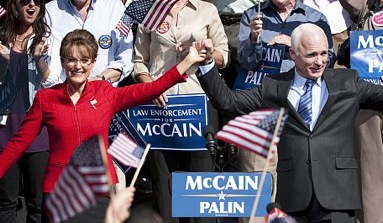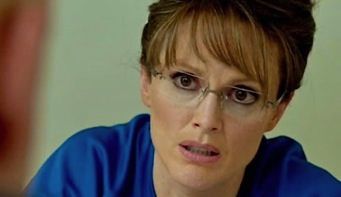
"[McCain] knows in his gut that he put somebody unqualified on the ballot. He knows that in his gut, and when this race is over that is something he will have to live with ... He put somebody unqualified on that ballot and he put the country at risk; he knows that." -- Matthew Dowd, Republican political strategist, fall 2008
Few made-for-television movies have arrived with the amount of fanfare, anticipation and attendant hyperbole as has HBO's political docudrama Game Change, which chronicles Sarah Palin's erratic and polarizing performance as the Republican Party's vice-presidential nominee during the historic 2008 presidential election. Almost as soon as the HBO production of John Heilemann and Mark Halperin's blockbuster was announced, critics -- particularly those from the Republican right -- began taking potshots at it. That chatter has built up to a veritable crescendo in advance of Game Change's premiere Friday on HBO at 9 p.m. The film repeats tonight, Sunday, at 7 p.m.
A good deal of the criticism -- including that from John, Cindy and Meghan McCain, and from Sarah Palin and her paid minions -- has been made by those who have not seen the film. Their pushback has been ferocious. Palin especially has torn into Game Change and has gone so far as to post a video response mocking the film on her political action committee website. It was as disingenuous as it was duplicitous -- and of course, it generated tons of ink and Internet traffic. The studio suits at HBO must be laughing all the way to the bank. You simply cannot buy this type of publicity.

That so much of the controversy is of a he-said-she-said nature has diminished the tenor of the scuffle to that of a playground dodge ball game. Part of the problem with Game Change (the book) -- and it is a problem that bleeds into the film as well -- is that there are no named sources in it. None. As a work of journalism, it leaves itself open to criticism that events didn't happen as depicted, particularly when only two people were there to witness them. It requires a proverbial leap of faith on behalf of its readers -- and viewers. As I've noted elsewhere in the Huffington Post, there were plenty of indisputable, documented instances of Palin's dysfunction and duplicity during the campaign.
In terms of its tone, Game Change reads like a titillating cross between People magazine and the National Enquirer, which makes for a fun read, but as a work of political journalism, it lacks in-depth analysis. For the record, I considered John Heilemann's piece on Palin for New York Magazine the very best work of mainstream journalism during the 2008 campaign. Game Change (the book) contains none of its analytical rigor.
It should also be pointed out that the subtitle of Heilemann and Halperin's book is: Obama and the Clintons, McCain and Palin, and the Race of a Lifetime. Most of the focus of their book is on the tenacious battle between Barack Obama, Hilary Clinton and the fallen John Edwards for the Democratic nomination. The McCain-Palin campaign, which garnered only a few small chapters, was mostly anti-climatic in their work.
In the film, however, Palin commands center-stage. The Obama-Clinton tussle is hardly mentioned. Edwards is nonexistent. McCain himself is little more than an afterthought. The focus is on the tension between Palin and McCain's senior adviser Steve Schmidt, the latter of whom goes through an agonizing epiphany as he gradually becomes aware that Palin is both psychologically -- and morally -- unfit to serve a heartbeat away from the presidency.
HBO purchased Game Change before it was even published. According to my sources in the film industry, the initial screenplay (written by Charles Leavitt) actually focused on the Democratic side of the contest, but was scrapped for "political reasons." That could be true, but I suspect it had as much to do with the fact that HBO already had a Clinton-centric docudrama in the works, The Special Relationship, a dramatic dud that premiered in 2010. Ironically, Julianne Moore was initially slated to play none other than Hillary Clinton in that production -- and what a waste that would have been.
That's because Moore is absolutely brilliant as the ambition-driven Palin, then the newly elected governor of Alaska, who was literally plucked from the Last Frontier in Cinderella-like fashion by McCain's merry band of political strategists. Watching some of the promotional clips from the film, I was worried that Moore's rendition might not hold up for two-hours. In fact, it took me little more than a few seconds to fall into Moore's performance. She absolutely inhabits Palin. Unlike Tina Fey's celebrated comedic caricature, which is largely one-dimensional, Moore remarkably captures Palin's dark, troubled, and delusional persona. She even manifests Palin's angry-fearful-deer-in-the-headlight look during a close-up of her eyes. It's chilling.

Woody Harrelson as Schmidt is also superb, though he didn't attempt to mimic his character as did Moore. Harrelson handles the dramatic journey taken by Schmidt with grace and sensitivity, without quite capturing his bulky gravitas or serious intelligence. Ed Harris, of whom I'm a huge fan, is fine as McCain, though he is more agile and angular than the aging Senator from Arizona, and he's also missing some of McCain's subterranean anger and volatility.
Those who have argued that Game Change represents a "liberal attack" on Palin are either lying or have their heads in some very dark crevice. The film is told through the eyes of two highly respected Republican operatives, Schmidt and Nicolle Wallace (played well enough by Sarah Paulson, though without quite enough of Wallace's toughness and fire.)
Both Schmidt and Wallace served in high-level capacities in the Bush White House and as senior advisers in the McCain campaign. Both were fiercely loyal to McCain and, initially, to Palin, before they both came to the realization, along with others in the campaign's inner sanctum, that Palin was "unfit" to serve as McCain's running mate. (Wallace recently has characterized Palin as "cuckoo for Cocoa Puffs.") One of the most startling moments in the film comes when a weeping Wallace tells Schmidt that she hadn't voted in the election, quite clearly because of the horror of Palin's behavior on the campaign trail.
As someone who spent more than two years researching and writing my own critical book, The Lies of Sarah Palin: The Untold Story Behind Her Relentless Quest for Power, I am more than a bit familiar with the terrain covered by Game Change. With few exceptions, I found its depiction of Palin's dysfunction during those fateful two months in 2008 both accurate and honest. Has there been some dramatic license taken in the film's narrative? Sure; it's not a documentary. Does it accurately capture the psychological imbalance manifested by Palin during the campaign, and, ultimately, Palin's betrayal of John McCain himself? Absolutely.
I have now watched the film twice; after both screenings I found myself moved and unsettled by it. And Palin's selection should have unsettled every American from across the political spectrum. To play this into a left-right issue, as many in the mainstream press have inanely sought to do, is to engage in sophistry, if not downright journalistic deceit. Game Change ultimately presents a moral challenge about what's right and wrong in the democratic process. It is not an ideological treatise.
To its credit, the film raises broader issues about the American political process, of which Palin is merely a symptom. Its portrayal of how the political sausage gets made does not for a pretty picture make. Near the end of the film, as a group of McCain campaign advisors sidle up to a Phoenix bar facing their inevitable defeat, Harrelson-as-Schmidt utters a prophetic line: "It wasn't a campaign, it was a bad reality show." Palin was picked by McCain's all-male pack of senior advisers not because of her experience and statesmanship, but because of a political calculus that placed a higher value on her flash than her substance. They were looking for a "game-changer" -- and they treated the political future of this country as though it were, indeed, a game.
I have a couple of minor beefs with the film and one major criticism. My friends in Alaska will most definitely be appalled by the benign portrayals of Palin's husband, Todd, and her eldest daughter, Bristol. Todd Palin was a sinister force in Alaska politics during Palin's tenure as governor; in the aftermath of the Troopergate scandal, in which he played a significant role, he was found guilty of contempt by Alaska's Senate for his failure to honor a subpoena during the investigation. For those Outsiders who want a more candid perspective on Todd and Bristol, let me suggest you watch some actual footage of the clan in Homer and Valdez, Alaska, along with a favorite clip of Bristol during her brief glimpse of reflected celebrity in Hollywood. The Partridge bunch they are not.
There's also a small, albeit, telling detail missing from the film. When McCain announced Palin as his selection at a well-staged event in Dayton, Ohio, he had to look down and read his notes to make sure he got her name right. Harris-as-McCain makes no such downward glance.
Moreover, it would have also provided some significant historical grounding if the film had shown actual footage of Colin Powell's game-changing endorsement of Obama and his condemnation of McCain for his selection of Palin as his running mate. It was probably the most powerful endorsement in the campaign.
Of even greater significance is the film's assertion that Palin was somehow snatched out of nowhere for her selection. When we see McCain's controversial uber-lobbyist adviser Rick Davis searching the internet to find Palin in the week leading up to the election, we are being led down a very duplicitous path.
I chronicle in detail in my book how Palin herself surreptitiously advanced her candidacy; how right-wing media hacks from Bill Kristol to Rush Limbaugh were pushing Palin as the VP candidate months before her selection. Davis and McCain had met Palin a half-year earlier at a meeting of the National Governors Association in Washington, D.C., right around the time McCain had secured the nomination. The Associated Press reported after that meeting that Palin was one of several governors under consideration to serve as McCain's running mate. That was a full six months before Palin's selection. In July, she was reported on McCain's "short list." The failure to vet Palin properly rests squarely on Davis' shoulders.
To be fair to everyone involved, McCain had wanted his pal and fellow Senate maverick Joe Lieberman to ride shotgun with him on the campaign. But as Game Change illuminates, only weeks before the convention, the Evangelical base of the Republican Party threatened to bolt if the pro-choice Lieberman was selected. It presented the McCain campaign with a Faustian dilemma. Palin's selection invigorated the base as never before, but it came with a troubling price attached. Near the end of Game Change, a somber McCain intones that there's "a dark side to American populism." Anyone watching the present debate inside the Republican Party as it stumbles toward its convention in Tampa later this year cannot help but be haunted by McCain's observation. There's a very dark side, indeed.
Award-winning writer and filmmaker Geoffrey Dunn's best-selling The Lies of Sarah Palin: The Untold Story Behind Her Relentless Quest for Power was published by Macmllan/St. Martin's in May of 2011 and will be published in paperback this May.
